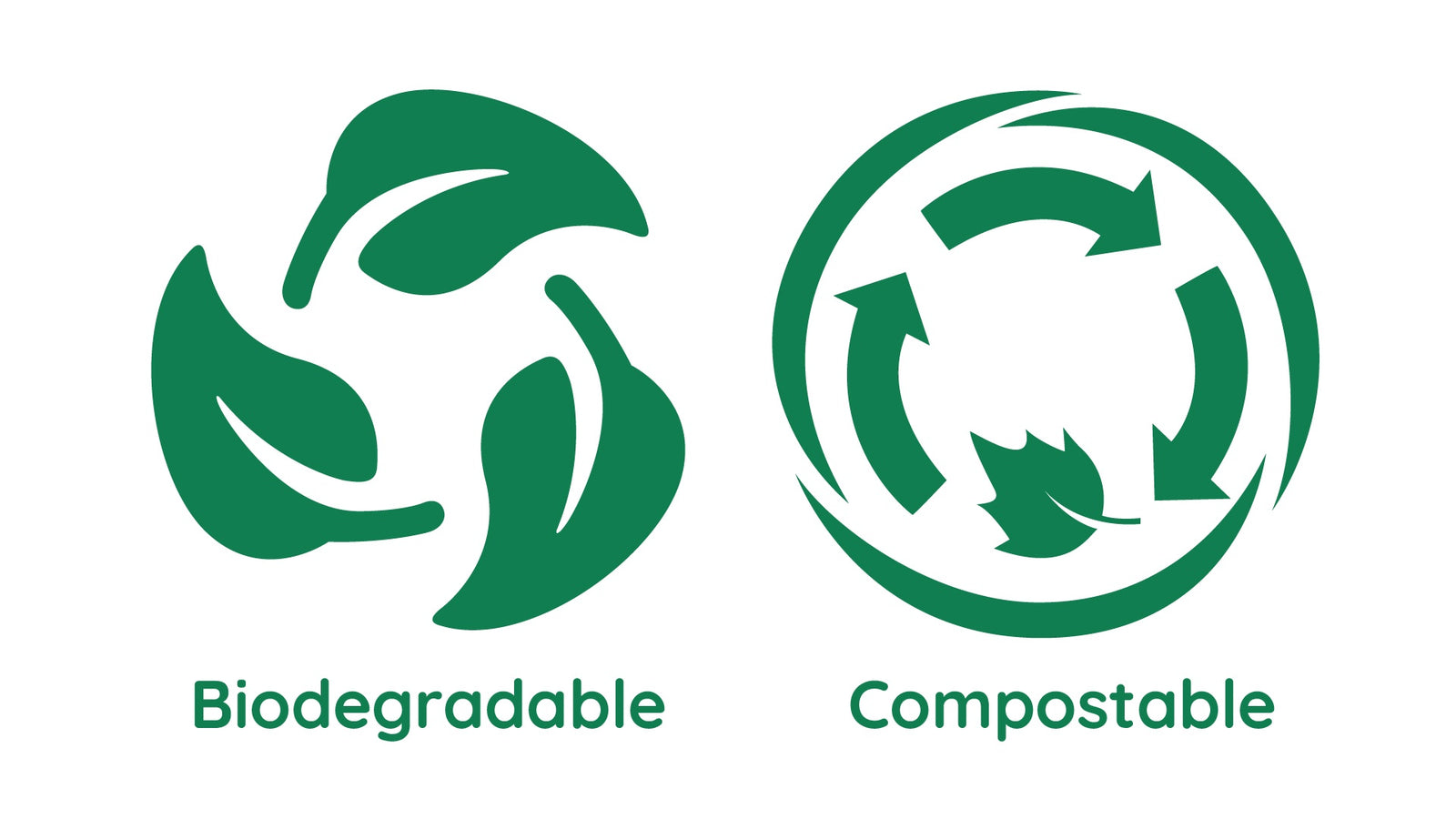Compostable và Biodegradable là hai thuật ngữ thường được sử dụng để mô tả khả năng phân hủy của vật liệu. Tuy nhiên, nhiều người vẫn chưa thực sự hiểu rõ sự khác biệt giữa hai khái niệm này, dẫn đến việc nhầm lẫn và sử dụng sai cách. Trong bài viết này, EQUO sẽ giúp bạn hiểu rõ hơn sự khác nhau giữa Compostable và Biodegradable, đồng thời tìm hiểu thêm một số ứng dụng trong sản xuất sản phẩm tự phân huỷ bảo vệ môi trường nhé!
1. Định nghĩa
Trong cuộc chiến chống ô nhiễm nhựa và quản lý rác thải hiệu quả, Compostable và Biodegradable đang trở thành những giải pháp hứa hẹn. Nhưng thực sự, Compostable và Biodegradable là gì và tại sao chúng lại quan trọng?
1.1. Compostable là gì?
Compostable (phân huỷ hữu cơ) là biến đổi các chất hữu cơ thành phân ủ "compost". Quá trình này diễn ra theo cơ chế sinh học, tạo ra CO2, nước, hợp chất vô cơ và sinh khối. Tốc độ phân hủy tương thích với các vật liệu hữu cơ khác, đảm bảo không để lại cặn bã gây hại cho môi trường.
Đây là phương pháp xử lý rác thải hữu cơ (như thức ăn thừa, rau củ quả, bã trà, bã cà phê, bã mía,...) trong điều kiện thoáng khí. Quá trình này tạo ra thành phẩm là phân hữu cơ, giàu dinh dưỡng (carbon, nitơ) và phù hợp để bón cho cây trồng.
Rác thải hữu cơ có thể được ủ thành phân bón hoặc chế biến thành chế phẩm enzyme/vi sinh để làm nước tầy rửa bề mặt, rửa chén bát, xà phòng,...

Nguồn: Internet
1.2. Biodegradable là gì?
Biodegradable (phân hủy sinh học) là quá trình các vi sinh vật đóng vai trò biến đổi nhựa thành những thành phần tự nhiên. Enzyme do các vi sinh vật tiết ra xử lý cấu trúc phức tạp của phân tử nhựa, biến chúng thành carbon dioxide (CO2) và nước (H2O).
Tuy nhiên, quá trình này vốn diễn ra khá chậm rãi. Để thúc đẩy tốc độ và hiệu quả của enzyme, các nhà khoa học đã sáng tạo ra những phụ gia mang hoạt tính sinh học. Nhờ đó, quá trình phân huỷ của nhựa diễn ra nhanh chóng hơn, tạo ra các sản phẩm tự nhiên như CO2, H2O và sinh khối trong một khoảng thời gian hợp lý.

Nguồn: Internet
Như vậy, Compostable và Biodegradable không chỉ là những khái niệm đơn thuần mà còn là giải pháp thực tế trong việc giảm thiểu tác động của con người đối với môi trường. Qua những quá trình tự phân hủy này, chúng ta không chỉ biến rác thải thành nguồn phân bón tái chế, mà còn góp phần xây dựng một tương lai xanh và bền vững.
2. Phân biệt Compostable và Biodegradable
Khi nói đến Compostable và Biodegradable, sự nhầm lẫn giữa hai khái niệm này thường xuyên gây nên hiểu lầm về khả năng phân hủy và ảnh hưởng đối với môi trường. Chúng ta sẽ cùng nhau tìm hiểu sâu hơn về những điểm khác biệt quan trọng giữa Compostable và Biodegradable, từ thời gian phân hủy, khả năng phân hủy, đến môi trường lý tưởng cho quá trình này.
2.1. Thời gian phân hủy
Compostable: Phân hủy nhanh chóng trong điều kiện ủ phân tiêu chuẩn (thường từ 90 - 180 ngày).
Biodegradable: Phân hủy chậm hơn, có thể mất nhiều năm hoặc thậm chí hàng thập kỷ trong môi trường tự nhiên.
2.2. Sản phẩm phân hủy
Compostable: Phân hủy hoàn toàn thành phân bón hữu cơ, cung cấp dinh dưỡng cho cây trồng.
Biodegradable: Phân hủy thành các hợp chất đơn giản như CO2, nước, sinh khối vi sinh vật, nhưng không nhất thiết tạo thành mùn hữu cơ.
2.3. Môi trường phân hủy
Compostable: Phân hủy tốt nhất trong môi trường ủ phân chuyên dụng, có kiểm soát nhiệt độ, độ ẩm và oxy.
Biodegradable: Phân hủy trong nhiều môi trường khác nhau, bao gồm môi trường tự nhiên như đất, nước, hoặc trong môi trường ủ phân.
Dưới đây là bảng so sánh chi tiết hai khái niệm Compostable và Biodegradable:
|
Đặc điểm |
Compostable |
Biodegradable |
|
Định nghĩa |
Phân hủy thành phân ủ |
Phân hủy thành các thành phần tự nhiên |
|
Thời gian phân hủy |
Nhanh hơn (thường từ 90 ngày đến vài tháng) |
Chậm hơn (nhiều năm) |
|
Khả năng phân huỷ |
Hoàn toàn, tạo mùn hữu cơ |
Không hoàn toàn, có thể thành mảnh vụn |
|
Sản phẩm phân hủy |
Compost (phân bón hữu cơ) |
Hợp chất đơn giản (CO2, nước, sinh khối vi sinh vật) |
|
Môi trường phân hủy |
Điều kiện ủ phân được kiểm soát (nhiệt độ, độ ẩm, oxy) |
Môi trường tự nhiên (có thể có hoặc không có sự kiểm soát) |
|
Ví dụ |
Vỏ chuối, vỏ đậu, thức ăn thừa,... |
Túi nilon sinh học, gỗ, hộp đựng thực phẩm làm từ bã mía, bã cà phê,... |
3. Lợi ích khi sử dụng sản phẩm có thể tự phân hủy
Sử dụng sản phẩm có thể tự phân hủy mang lại nhiều lợi ích to lớn cho môi trường và cộng đồng:
3.1. Giảm thiểu rác thải rắn
Rác thải rắn là vấn đề nhức nhối đang ảnh hưởng đến toàn cầu. Theo ước tính, mỗi năm thế giới thải ra hơn 2 tỷ tấn rác thải rắn. Sản phẩm tự phân hủy sẽ phân rã thành các thành phần tự nhiên trong môi trường, không tạo ra rác thải rắn tồn tại lâu dài.

Nguồn: Internet
3.2. Bảo vệ và tăng cường tính bền vững của môi trường
Rác thải rắn đặc biệt là rác thải nhựa gây ô nhiễm môi trường nghiêm trọng, ảnh hưởng đến đất, nước và không khí.
Sản phẩm tự phân hủy góp phần bảo vệ môi trường bằng cách:
- Giảm thiểu lượng rác thải rắn thải ra môi trường.
- Hạn chế ô nhiễm đất, nước và không khí.
- Bảo vệ hệ sinh thái và đa dạng sinh học.

Nguồn: Internet
Mỗi hành động, dù nhỏ nhất, đều có thể tạo nên sự khác biệt lớn lao trong việc bảo vệ hành tinh xanh của chúng ta. Hãy là người tiêu dùng thông minh và có trách nhiệm, chung tay xây dựng một thế giới không rác thải, nơi mà Compostable và Biodegradable không chỉ là những từ ngữ mà là những hành động cụ thể, mang lại lợi ích cho môi trường và cho chính chúng ta.
4. Thách thức khi sử dụng sản phẩm có thể tự phân hủy
Mặc dù mang lại nhiều lợi ích, việc sử dụng sản phẩm có thể tự phân hủy vẫn còn gặp phải một số thách thức:
4.1. Chi phí cao hơn so với sản phẩm truyền thống
Giá thành sản xuất sản phẩm tự phân hủy cao hơn do sử dụng nguyên liệu đặc biệt và quy trình sản xuất phức tạp hơn. Điều này khiến giá bán sản phẩm tự phân hủy cao hơn so với sản phẩm truyền thống, gây khó khăn cho người tiêu dùng trong việc tiếp cận.

Nguồn: Internet
4.2. Hạ tầng ủ phân chưa phát triển
Hạ tầng ủ phân cần thiết để xử lý sản phẩm tự phân hủy chưa phát triển rộng rãi, đặc biệt là ở các khu vực nông thôn. Thiếu hụt hệ thống thu gom và xử lý rác thải Compostable khiến việc sử dụng sản phẩm tự phân hủy gặp nhiều bất tiện.
4.3. Nhận thức của người tiêu dùng còn hạn chế
Nhiều người tiêu dùng chưa hiểu rõ về lợi ích và cách sử dụng sản phẩm tự phân hủy. Thiếu thông tin và sự tuyên truyền khiến người tiêu dùng e ngại trong việc sử dụng sản phẩm mới.

Nguồn: Internet
Sử dụng sản phẩm tự phân hủy là một giải pháp thiết yếu để bảo vệ môi trường. Việc giải quyết các thách thức sẽ giúp thúc đẩy sử dụng sản phẩm tự phân hủy rộng rãi hơn, góp phần bảo vệ môi trường và phát triển bền vững.
5. Ứng dụng sản xuất các sản phẩm có thể tự phân hủy
Sản phẩm tự phân hủy ngày càng được ứng dụng rộng rãi trong nhiều lĩnh vực, góp phần bảo vệ môi trường hiệu quả. Dưới đây là một số ví dụ điển hình:
5.1. Hộp đựng thực phẩm
Hiện nay, trên thị trường có nhiều loại hộp đựng thực phẩm tự phân hủy với đa dạng mẫu mã, kích thước và giá cả. Người tiêu dùng có thể dễ dàng lựa chọn sản phẩm phù hợp với nhu cầu sử dụng của mình.
Hộp đựng thực phẩm EQUO làm từ 100% bã mía là giải pháp thay thế thân thiện với môi trường, bền chắc, linh hoạt trong khả năng đóng gói, và chất lượng thoáng khí, không thấm nước, có thể phân hủy hoàn toàn trong môi trường tự nhiên trong khoảng 6 tháng.

5.2. Ống hút
Tất cả các sản phẩm ống hút của EQUO đều làm từ nguyên liệu thiên nhiên như: gạo, cỏ, bã mía, bã cà phê, và dừa,... và 100% không chứa nhựa hay các hoá chất độc hại nào khác. Những ống hút này có thể phân huỷ hoàn toàn trong môi trường từ 3-6 tháng, không chỉ bảo vệ môi trường mà còn đảm bảo an toàn cho người tiêu dùng, phù hợp với mọi loại đồ uống. Và EQUO tự hào khi cung cấp tất cả các giải pháp trên để thay thế ống hút nhựa truyền thống, góp phần giảm thải lượng rác vô cơ, đặc biệt là ống hút nhựa, có thể cần đến vài trăm năm để phân hủy hoàn toàn.
- Ống hút cỏ: Làm từ cỏ bàng, mang sắc xanh tự nhiên, là giải pháp thân thiện với môi trường.
- Ống hút gạo: Sản xuất từ 100% tinh bột gạo và bột sắn. Được tạo màu từ nước ép rau quả và có khả năng phân huỷ sinh học, an toàn cho sức khỏe.
- Ống hút cà phê: Được chế tạo từ bã cà phê, hoàn toàn không chứa nhựa, không chỉ thân thiện với môi trường mà còn mang hương thơm đặc trưng của cà phê.
- Ống hút bã mía: Làm từ bã mía, có mùi thơm ngọt nhẹ, phân huỷ sinh học, không làm thay đổi hương vị đồ uống.
- Ống hút dừa: Sản xuất từ 100% nước dừa lên men, có khả năng đàn hồi tốt, không tan trong nước.
Để tham khảo thông tin chi tiết của các sản phẩm trên bạn có thể truy cập:
>> https://shopequo.com/vi/collections

5.3. Dụng cụ ăn uống
Bộ dụng cụ ăn uống EQUO bao gồm dao, muỗng, nĩa là sản phẩm được làm từ đa dạng các nguyên liệu như bã mía, bã cà phê, gỗ. Đây là những nguyên liệu tự nhiên và hoàn toàn có thể phân hủy, là lựa chọn lý tưởng cho những ai đang tìm kiếm giải pháp thay thế thân thiện với môi trường cho các sản phẩm nhựa dùng một lần.

5.4. Túi rác
Túi rác tự phân hủy là loại túi được sản xuất từ các nguyên liệu tự nhiên như tinh bột, bột bắp, sắn,... hoặc các hợp chất sinh học có khả năng phân rã hoàn toàn trong môi trường tự nhiên. Nhờ đặc điểm này, túi rác tự phân hủy trở thành giải pháp thay thế hiệu quả cho túi rác nilon truyền thống, góp phần bảo vệ môi trường hiệu quả.

Nguồn: Internet
Trong hành trình hướng tới một tương lai bền vững, việc hiểu rõ và áp dụng đúng cách các khái niệm như Compostable và Biodegradable là hết sức quan trọng. Bài viết này đã cung cấp cái nhìn sâu sắc về hai thuật ngữ này, giúp chúng ta phân biệt và sử dụng chúng một cách hiệu quả trong cuộc sống hàng ngày. EQUO hy vọng rằng, thông qua những kiến thức được chia sẻ, mỗi chúng ta sẽ trở thành những chiến binh thực sự trong cuộc chiến chống lại ô nhiễm và bảo vệ môi trường. Hãy cùng nhau tạo nên một tương lai xanh - sạch - đẹp hơn.






